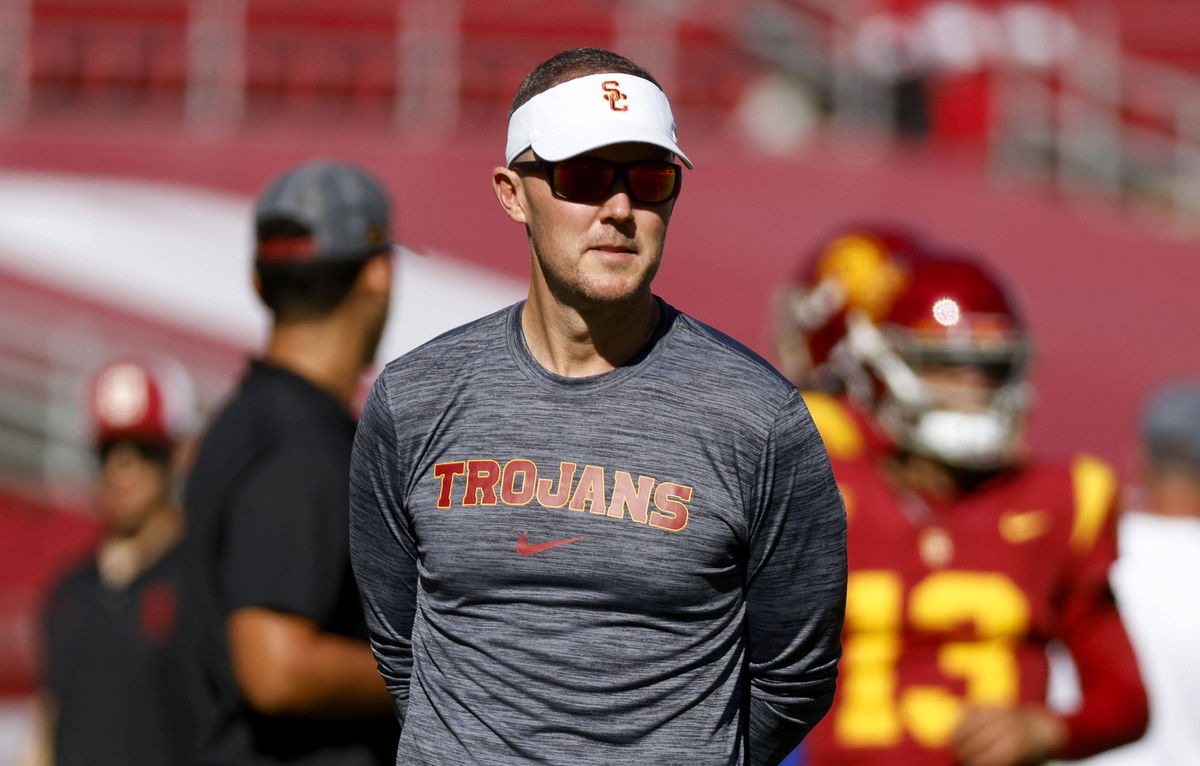
Imago
Despite an injury-hit season for USC Trojans, Lincoln Riley has led them to the top six of B1G.

Imago
Despite an injury-hit season for USC Trojans, Lincoln Riley has led them to the top six of B1G.

Imago
Despite an injury-hit season for USC Trojans, Lincoln Riley has led them to the top six of B1G.

Imago
Despite an injury-hit season for USC Trojans, Lincoln Riley has led them to the top six of B1G.
USC escaped West Lafayette with a 33-17 win that felt closer than the final score, because a three-hour lightning delay, a weird trick-play touchdown, and a fourth-quarter wobble kept the door open longer than anyone in cardinal would’ve liked. Jayden Maiava was efficient and tough, going 17-of-28 for 282 yards and a short rushing score while Waymond Jordan and Eli Sanders combined for 152 on the ground. But Purdue’s Ryan Browne kept firing, finishing 24-of-39 for 305 yards with a touchdown and three picks, and the Boilermakers never quite went away until Fitzgerald closed the door later.
Watch What’s Trending Now!
Despite the win, HC Lincoln Riley was forced to answer for every penalty, turnover, and miscue that nearly cost the Trojans the game. If the margin tightened, it was because the self-inflicted stuff stacked up for USC at the worst possible times. The Trojans were flagged 9 times for 104 yards, including two separate “offensive sideline interference” penalties, one right after Maiava’s opening 59-yard strike and another following a third-quarter PAT, that undercut momentum and field position. A leaping flag on punt protection extended a Purdue drive, a false start in the red zone stalled another push, and a roughing-the-passer call even erased an interception as the Boilermakers kept breathing.
Ryon Sayeri also yanked a 37-yard field goal with 8:30 to go, and the game briefly felt like it might slip into the same late-game anxiety that haunted last year’s road trips. Then came the third-quarter sequence: a backward pass that turned into Browne’s 34-yard scoop-and-score, making the path to the finish line longer than it needed to be.

Imago
September 06, 2025 USC Trojans head coach Lincoln Riley in action during the NCAA, College League, USA football game between the USC Trojans and Georgia Southern Eagles at the Los Angeles Coliseum in Los Angeles, California. Mandatory Photo Credit : /CSM Los Angeles United States of America – ZUMAc04_ 20250906_zma_c04_513 Copyright: xCharlesxBausx
That’s the backdrop for Lincoln Riley’s postgame tone: firm about process, honest about mistakes, and clear that frustration wasn’t the point. When asked about landing the knockout blow and whether he was frustrated it didn’t come sooner, he answered, “You just play the game… if there was frustration that one didn’t come sooner, then we didn’t listen to the way that we were coached,” before adding, “Unique things are going to happen… we had a few penalties that we know we got to do better.” He volunteered the detail that there were “two sideline interference” penalties and said one “caused me to screw up not going for two when we were up, I think 20 at the time, so they’re 19 at the time,” a nod to the decision chaos that can follow administrative flags in special-teams sequences.
Lincoln Riley’s larger message matched what the tape showed. “We all had some errors, we all got to get better, but you just got to keep playing, that’s just the nature of the road you’ve got to withstand it,” he said, and the finish did reflect that, with USC going 4-for-4 on fourth down, avoiding turnovers, and turning three takeaways into separation when it mattered. After Sayeri’s miss, Purdue threatened again before Fitzgerald’s second interception stemmed the tide, a sequence that felt like a tangible step from last season’s late-game stumbles. Even during the week, Lincoln Riley had harped on discipline penalties as the non-negotiables, separating acceptable aggression from avoidable, drive-extending mistakes, a distinction that loomed over this one.
That’s the story going forward: the bones of a road-ready team are here, but the edges have to be smoothed before the schedule’s biggest punches land. 9 penalties for 104 yards, two sideline interference calls, a missed 37-yarder, and a wiped-out interception are the exact ingredients that turn comfortable wins into coin flips against top-tier opponents. USC withstood it this time. But next time, they’ll have to trim the mistakes, keep the fourth-quarter poise like they did, and that knockout blow will arrive on schedule instead of after a few too many tense breaths.
One 10-day January portal gains support.
The sport is moving toward a single 10-day transfer window that would open Jan. 2, right after the CFP quarterfinals. December would be a dead period for in-person recruiting, with remote contact still allowed. The change isn’t final yet, but it’s close, and it has stirred familiar tensions about postseason rosters, calendar crunch, and competitive balance.
Lincoln Riley’s stance is measured. He supports consolidating the windows while admitting no date will please everyone. “I don’t know where you put it. I’m glad that we just have one,” he said. “There’s gonna be some sacrifice one way or another.” He also acknowledged why some colleagues bristle at the timing. “You hear the arguments… ‘Well, hey, this shouldn’t be during the playoffs,’ which I mean, I agree.” He then drew a simple comparison that the NFL would never drop free agency in the middle of its playoffs.
Pragmatism, not perfection, is the theme. Riley still backed the move even as he conceded the core problem. “I just think the system, honestly, right now doesn’t make for a good place to put it,” he said. One window brings clarity for staff, players, and compliance. It also forces tough choices for teams still playing deep into January. The debate will continue. But the signal here is clear: simplify the process, accept the tradeoffs, and keep the postseason from being swallowed by a month-long roster scramble.





